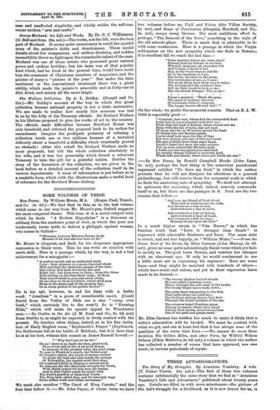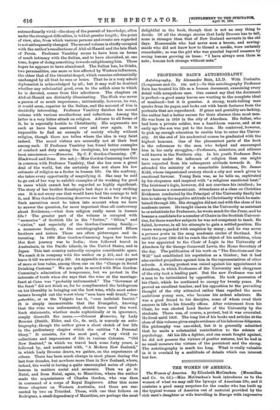The Story of Hy Struggles. By Arminins Vambhy. 2 vole.
(T. Fisher Unwin. 21s. net.)—The first of these two volumes contains substantially the same story that we find in " Arminius Vambery's Life and Adventures," published about twenty years ago. Details are filled in with more minuteness—the picture of the lad's struggle for a livelihood, as it is now drawn for us, is extraordinarily vivid—the story of the pursuit of knowledge, often under the strangest difficulties, is told at greater length ; the point of view, also, from which various persons and events are regarded is not unfrequently changed. The second volume is chiefly occupied with the author's recollections of Abd-ul-Hamid and the late Shah of Persia. Professor Vambery seems to have been on terms of much intimacy with the Sultan, and to have cherished, at one time, hopes of doing something towards enlightening him. These hopes he appears to have abandoned. The Sultan has, he thinks, two personalities, one more or less affected by Western influences, the other that of the Oriental despot, which remains substantially unchanged by all that he sees or hears. That he is a very adroit diplomatist is acknowledged by all ; but it may well be doubted whether any substantial good, even to the selfish aims to which he is devoted, comes from this adroitness. The chapters on Abd-ul-Hamid are distinctly illuminating. The Shah was never a person of so much importance ; intrinsically, however, he was, it would seem, superior to the Sultan, and the account of him is decidedly interesting. Professor Vambery finishes his second volume with various recollections and reflections. Among the latter is a very bitter attack on religion. Adverse to all forms of it, he is especially hostile to Christianity. His arguments are such as have been answered over and over again. It is impossible to find an example of society wholly without religion, though there are tribes where the idea is very faint indeed. The moral virtues are assuredly not at their best among such. If Professor Vambery has found better examples of conduct and duty among the irreligious, his experience has been uncommon.—Memories. By C. F. Gordon-Cumming. (W. Blackwood and Sons. 20s. net.)—Miss Gordon-Cumming has this in common with Professor Vambery, that she has seen a great deal of the world, but she certainly does not share his low estimate of religion as a factor in human life. On the contrary, she takes every opportunity of magnifying it. She may be said to go out of her way to exhibit examples of its working for good in cases which cannot but be regarded as highly significant. The story of her brother Roualeyn's last days is a very striking one. It is not every one that would have had the courage to tell it, and Miss Gordon-Cumming deserves our thanks for doing so. Such narratives must be taken into account when we have to answer the question, far more important than all controversy about Evidences,—what does religion really mean in human life ? The greater part of the volume is occupied with " memories " of Scottish life in the "forties," "fifties," and "sixties," and especially of the Gordon-Cumming family,— a numerous family, as the autobiographer counted fifteen brothers and sisters. These are often picturesque and in-, teresting. In 1868 Miss Gordon-Cumming began her travels. Her first journey was to India ; then followed travel in Australasia, in the Pacific islands, in the United States, and in Japan. This last country naturally occupies considerable space. We reach it in company with the author on p. 231, and do not leave it till we arrive at p. 341. An appendix contains some papers of more or less value, among them one on the "Change in Social Drinking Customs." We are quite in accord with Miss Gordon- Cumming's admiration of temperance, but we protest in the interests of truth when she says that the wine at the marriage- feast at Cana was "probably unfermented." The "Governor of the feast" did not think so, for he complimented the bridegroom on his liberality in bringing out the best wine, while most enter- tainers brought out the worst when "men have well drunk," gray p.severinrs, or as the Vulgate has it, "cum inebriati fuerint." It is simply inconceivable that the Evangelist, knowing that the wine was unfermented, should have used the word. Such statements, whether made sophistically or in ignorance, simply discredit the cause.—Cotonial Memories, by Lady Broome (Smith, Elder, and Co., 62. net), is scarcely an auto- biography, though the author gives a short sketch of her life in the preliminary chapter which she entitles "A Personal Story." It consists, for the most part, of very vivid re- collections and impressions of life in various Colonies. "Old New Zealand," in which we travel back some forty years, is followed by, and contrasted with, "A Modern New Zealand," in which Lady Broome draws, we gather, on the experiences of others. There has been much change in most places during the last four decades, but nowhere more than in New Zealand, where, indeed, the world is having a quite unexampled series of object- lessons in matters social and economic. Then we go to Natal, and from Natal, again, to Mauritius, where the author made the acquaintance of Charles Gordon, who was then in command of a corps of Royal Engineers. After this come three chapters on Western Australia, and these are suc- ceeded by two on Trinidad. These, with one that follows on ltodrigues, a small dependency of Mauritius, are perhaps the most delightful in the book, though that is not an easy thing to decide. Of all the strange stories that Lady Broome has to tell, none is stranger than that of New Zealand servants in the old days. Housemaids who had never seen a broom, and sewing- maids who did not know how to thread a needle, were certainly remarkable; so was the girl who was puzzled beyond measure by seeing lemons growing on trees: "I have always seen them in nets; lemons look strange without nets."



















































 Previous page
Previous page